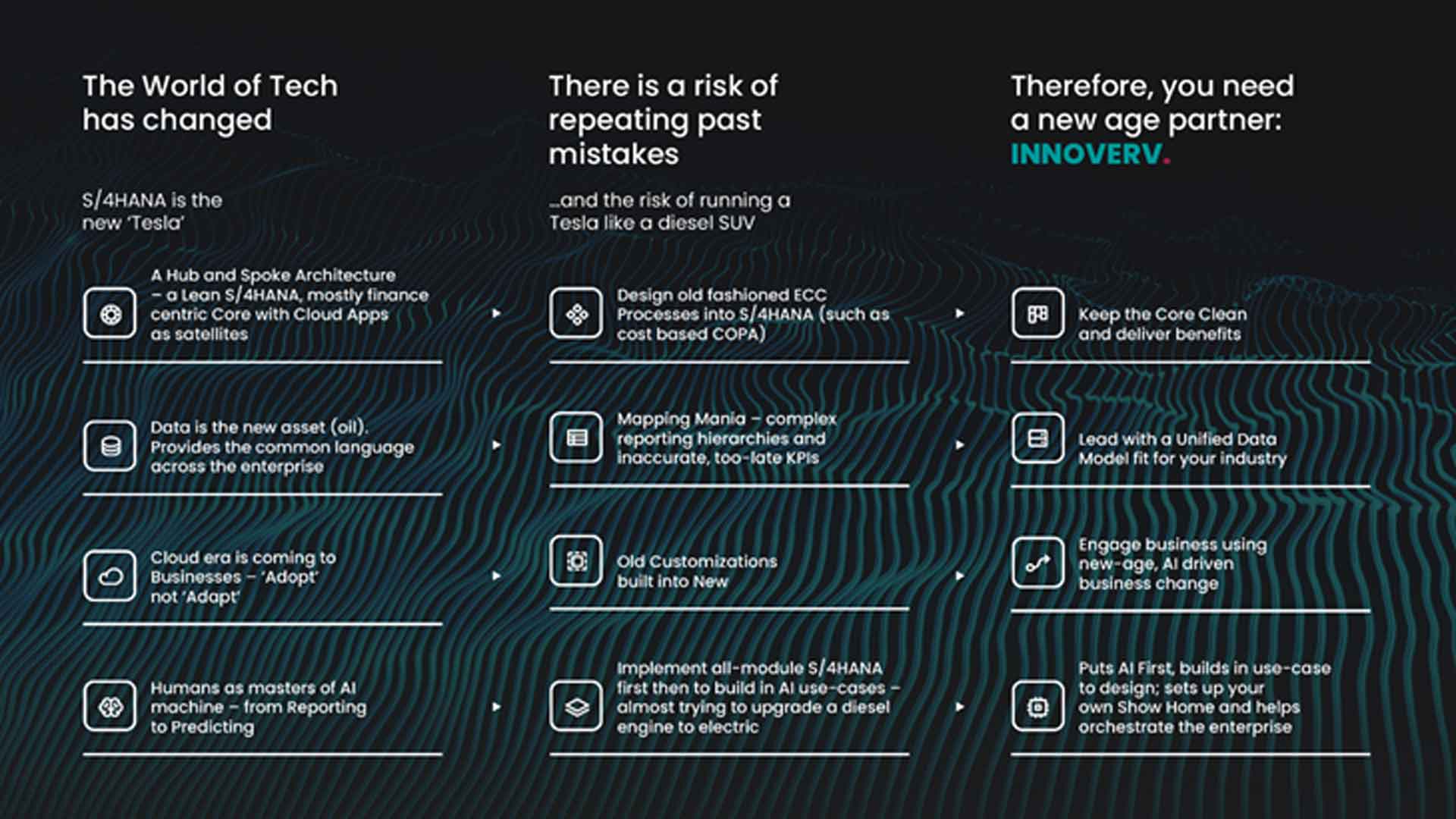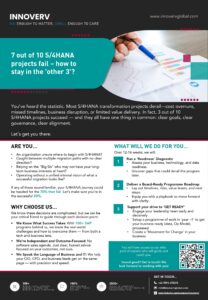
How do we apply AI at scale in our Business?
September 11, 2023Is sponsoring an S4HANA
a route to getting fired?

We’ve all heard the horror stories of the ECC era where SAP ERP implementation programmes went well over budget, costs millions in lost revenue and even got some organisations fined (remember Nike, HP, or Lidl).
Is this era back?
With the 2027 SAP ECC to S/4HANA deadline looming, many organisations are looking to make the move, but are there many reservations on what will be different this time? Many execs claim, “This is a huge investment, and I know I need to sponsor it but if this goes wrong it’s my career on the line. Do I really need this? Is there an option to push it down the road, or make it someone else’s problem?”

We are already starting to see some winners and losers in the move, and there are many lessons to be learnt. The key one being – don’t treat an S/4HANA implementation the same way you did ECC. In that way lies the disaster.
Why is it different?
Similarly, technology is moving so fast, we cannot take 4 years to implement S/4HANA and then think of AI. We need to think differently.
If we don’t understand these concepts and buy into it from day one, no S/4HANA implementation will go well. Here’s why:
- The Hub & Spoke – S/4HANA will be fundamentally smaller in scope than ECC. With most processes now moving to functional cloud applications (Salesforce, BlueYonder, Ariba, SucessFactors, etc.) the ‘Hub’ S/4HANA will be much smaller in scope. This causes a few complexities: What size should the hub be? And, What sequence can we implement in the hub & spokes? Additionally, there will significantly more integration points than in the ECC era! It takes careful design, sequencing, and planning to get these decisions right. There is no one answer for all – so we must think deeply. This specific point has already caused significant delays to S/4HANA programmes. Therefore, it’s best to get to it right now.
- Data is King – Because of this, fragmentated landscape data is now all over the place without one common language. If we do not define our data model and find a solution for reporting and analytics on day one of the programme, we could be left with a shiny and presentable S/4HANA, but not actually be able to complete the analytics that we hoped for. It is integral to not leave this topic too late, and lead with Data.

- Adopt not Adapt – There is a real risk when we build old in new. Technology has moved on; hence, we must use standard where possible, and not customise. It’s easier said than done, but if something is really not business value enhancing (i.e. making a payment) the standard is good enough. There are many organisations saying, “I invested multi-millions, did I really get the benefits or just a new system?” Focusing on moments that matter, getting these specifics right, and not worrying about designing every process from scratch can really take any business forward.
- AI first, not last – This aspect hasn’t hit yet, but it will. AI can’t be a bolt on at the end of an S/4HANA transformation programme. It can’t wait. Identifying the use cases that can be implemented in S/4HANA and alongside S/4HANA is integral. It’s best to not wait for years to roll out S/4HANA, and then realise that you didn’t automate, augment and change ways of working. Now is the time.

What to ask yourself?
“Am I confident in my team, their capability, and their understanding of these technological changes? Do I understand what we are doing, and why it will make my business better? Is the scope game changing enough to actually deliver value? Have we done enough thinking, validation, and challenges on our programme to know that it’s the right approach, and is achievable? Do I have the right thought leaders who have seen and done this before, that can coach and guide my team?”
If the answer to any of the above questions is “no”, then think deeply about your readiness to embark on this journey. Be sure to not turn a blind eye, as this won’t help the case.
Finally, remember ‘you can’t sponsor it, you need to own it’. Therefore, make sure the programme is well understood. Do the required research, connect with peers, ask colleagues and peers about their experiences, and genuinely educate yourself. There is a need to be an expert, but we need to own it. This allows us to challenge, guide and lead in a different way. Any change should be something we are proud of, and therefore must be given the required time and attention.




